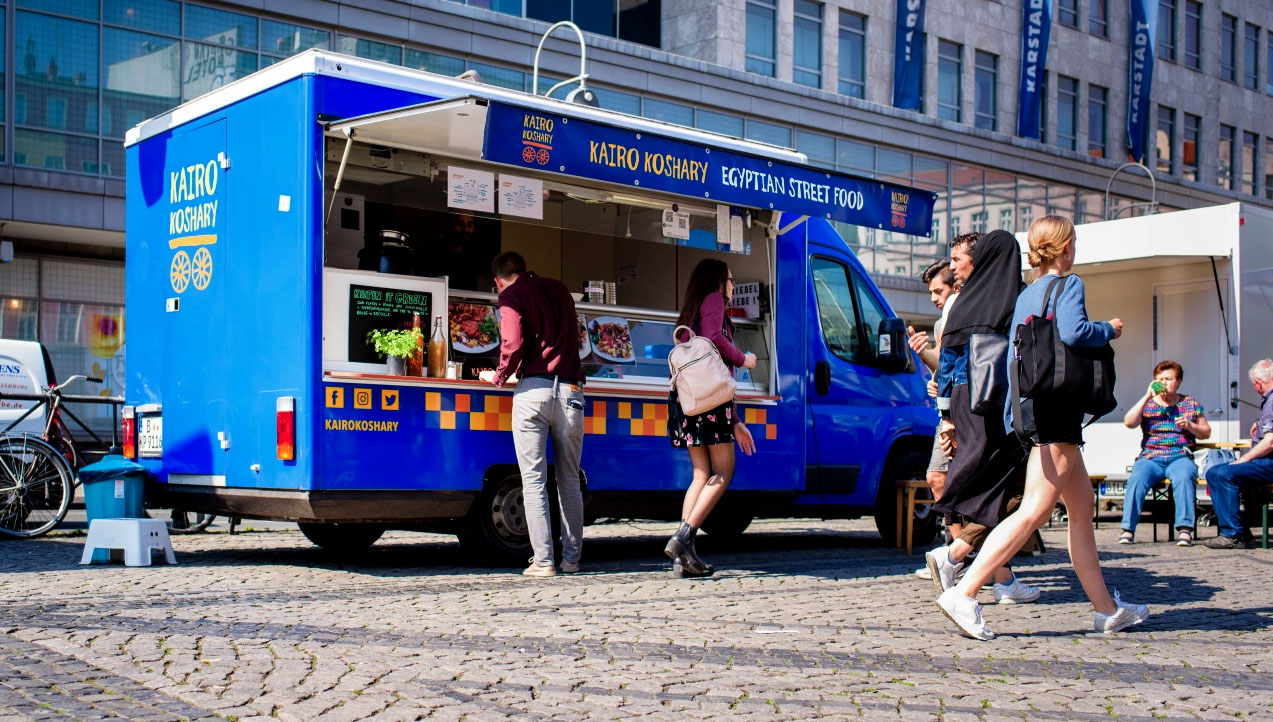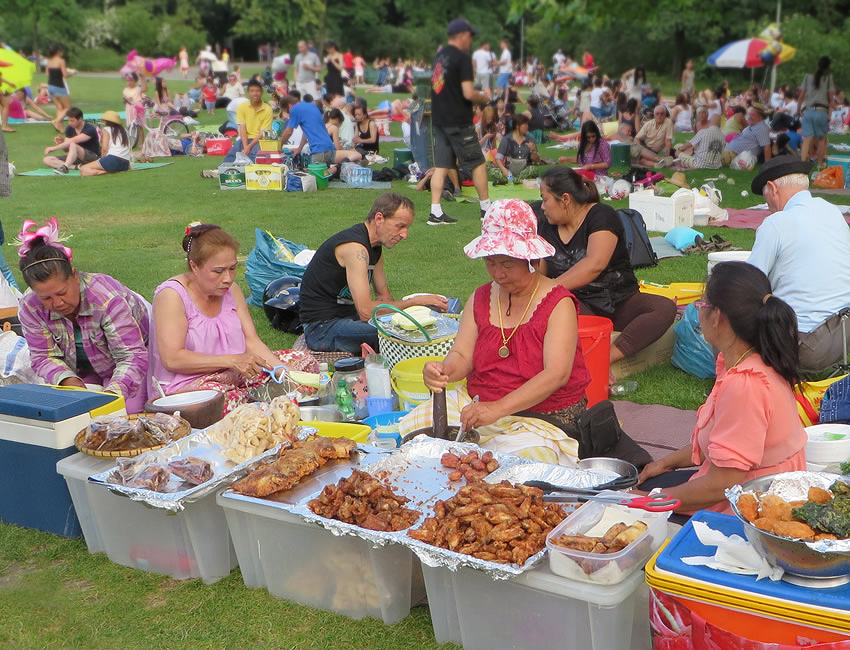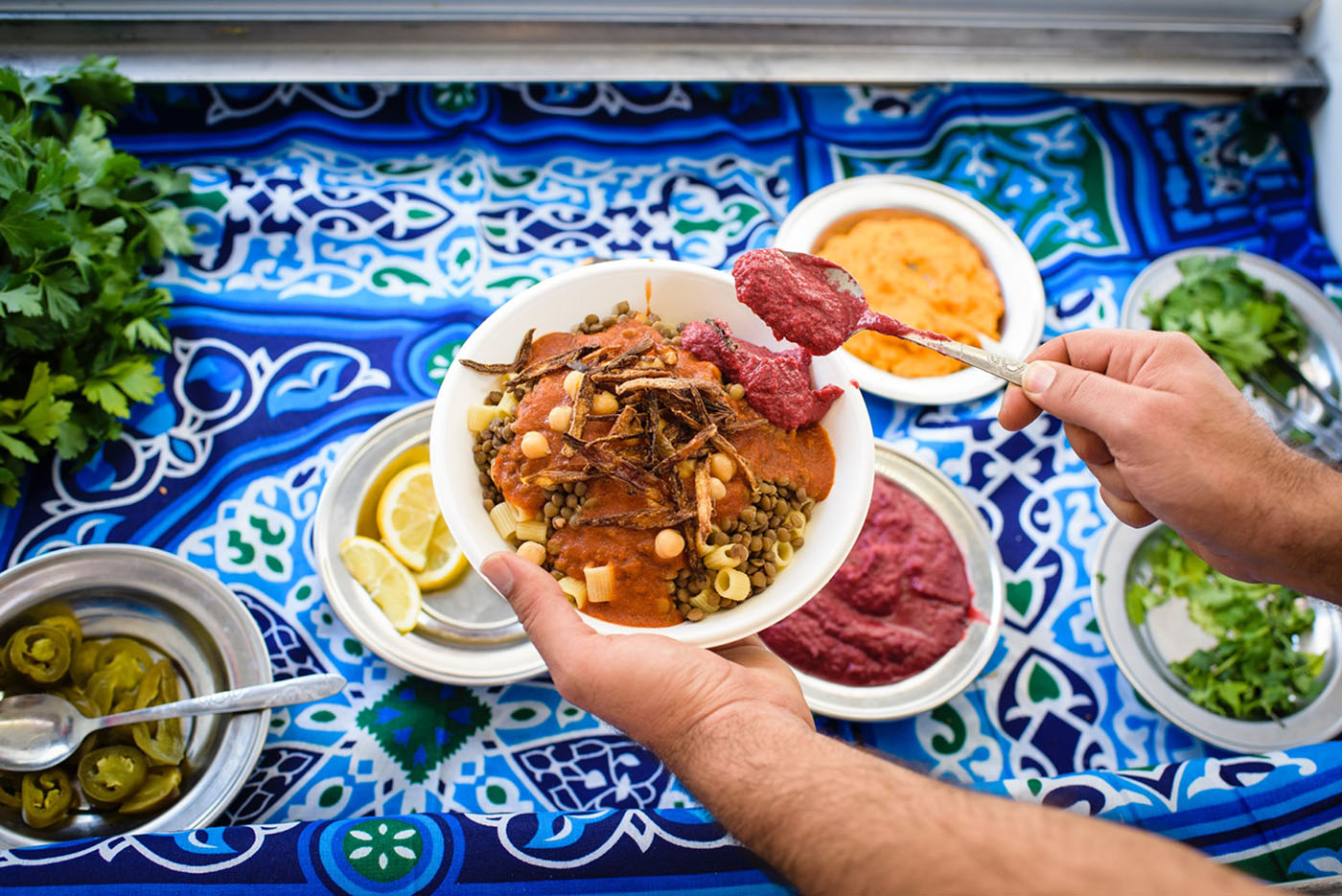
Berlin has been dubbed the capital of Arab culture. Thousands of artists, writers, musicians, actors, and filmmakers descended on Berlin with more freedom to express themselves, without repercussions from repressive governments or conservative societies. Music, films, books, dance, theatre exploded on the cultural scene in Berlin. Many addressed the hardships of conflict, while other insisted that their work must transgress the expectations of a refugee.
Mohamed Radwan
Koshary is a dish that reflects Egypt’s history of the last few centuries, a product of colonization, migration, its egalitarian system and the economic conditions of the period. It is said the British occupation forces arrived in Egypt from India with the earliest version — similar to “Khichri,” an Indian rice and lentil dish. With the Italian and Ottoman influences in Egypt, pasta and tomato sauce were added. Our proximity to the Levant region resulted in hummus beans (aka chickpeas) being introduced to the dish. Finally, the crispy fried onions, hot sauce and garlic vinaigrette sealed the deal. Koshary remained under this same recipe for decades.
But what does that have to do with me and Berlin, other than the fact that as an Egyptian I am a fan, like anyone else, of this meanwhile very Egyptianized dish?
In 2015, Cairo had seen the swing from revolution to military rule, and since living through 9/11 in the US, I had decided to avoid fascist-leaning societies. The plan was to head towards the islands of the South Pacific. Instead, Berlin found me and I found someone in Berlin. It happened to coincide with the biggest year of migration to the Germany in decades, many from Syria, a country I once called home.
Upon arriving in Berlin, I met many friends from the past, from Cairo, Damascus, Beirut and Amman. I made new friends from Palestine, Libya, Tunisia and Iraq. As many of the new arrivals embarked on the journey together, we knew we were blessed. Berlin has been dubbed the capital of Arab culture. Thousands of artists, writers, musicians, actors, and filmmakers descended on Berlin with more freedom to express themselves, without repercussions from repressive governments or conservative societies. Music, films, books, dance, theatre exploded on the cultural scene in Berlin. Many addressed the hardships of conflict, while other insisted that their work must transgress the expectations of a refugee. We were also blessed with the previous waves of migration and their occupation of Sonnenallee aka Share3 El 3arab or “Arab Street” as it is also known.
Even though Berlin had changed a lot since my arrival, its infamous past seemed to live on, albeit in a watered down version. Ever since the unity of East and West, the fall of the wall, and the onslaught of neoliberal capitalism, Berlin has changed in a myriad of ways. The last squat houses were being forcibly emptied, taking with them a part of the city that cared nothing for the establishment. The anarchist and leftist movements that filled these houses were not a mere trend, they had emerged directly from the Cold War that had just ended. But as Berlin changed, and asset fund managers found their way from North America to the Cayman Islands through to Luxembourg, they bought buildings and drove rent prices so high that swaths of Berliners ending up having to leave the city in search of more affordable housing. Despite the demographic changes, Berlin still seemed to capture people with its still somewhat chaotic, unpolished, anti-authoritarian attitude.
This ostensible disregard for rules plays out in different ways and illustrates Berlin’s wanton attitude towards rules, laws and regulations. It happens on a micro level and up to the Berlin Senate level. It could be that every single person on a Saturday night will have a beverage in hand while riding the metro, or U-Bahn, despite the signs forbidding drinks plastered everywhere. Around Neukölln — a predominantly Arab and Turkish district — if you don’t jaywalk, then you obviously do not live in the area, but if you do, watch for the cars running red lights. You also still see the continued resistance against the clearing of squats. But on a city level, it could be an airport opening up 10 years late because of scandal after scandal.

Until this year, the “Thai Park” was a choice location for delicious authentic Thai food. The park would have roughly 50 pop-up kitchens in the middle of the garden, completely unregulated. Many offered Pad Thai, and the green papaya salads and an array of coconut curry dishes would keep everyone happy. They even offered fried crickets among other critters. This self-regulated micro economy continued for many years without any interference from the government. On the contrary, more people would set up shop until it became a weekly festival with park goers enjoying beverages and the excellent cuisine. This is laissez-faire in a different way. This is the spirit of Berlin.
The Koshary Revolution
Of the over 60 countries I have visited in the world, Berlin offers some of the best Arab cuisine outside the SWANA region. The delicious falafel and shawarma are ubiquitous. During difficult times, comfort food goes a long way. It reminds us of our home and our friends and families. Even for the rest of Berliners, falafel has become the prime choice for late night munchies. In 2014, a friend of mine finished a PhD on the rise of falafel shops and investigated the potential correlation with gentrification. She interviewed 200 shop owners. Arab food was already part of the fabric of the city upon our arrival.
It was time for someone to represent, not just with another shawarma stand, but with the Egyptian dish so many of us in the diaspora longed for — one that was practically nonexistent outside of the Middle East and always a topic of discussion as a potential business venture. However, in the spirit of Berlin, things would be adapted, altered and rules were to be broken.
Thus, what Egyptians in Berlin still lacked in 2016 was the undisputed masterpiece of Egyptian cuisine, koshary — the famous dish that strikes into the heart of every Egyptian, especially when it’s sub-zero temperature and you ponder why one would ever leave the luxury of sunny Egypt. To be fair, there was a restaurant serving koshary, it even bore the name. But even the most leftist, anti-discrimination, exiled Egyptian political dissidents (and their numbers were quickly increasing) couldn’t resist falling into the trap of food nationalism and critiquing the German-owned restaurant. These were the conditions that first sparked the idea of Kairo Koshary, the first koshary food truck in Berlin…and perhaps in the entire world.

Maybe some people find the lack of harmony expected in a country like Germany worrying, but others find the need to negotiate an important part of life. Those “others” live in Berlin. What a perfect place for a koshary truck. Yet, what happened in the next few years opened my eyes to Berlin, the bureaucratic nightmare with the same apathy that gives you the Späti, or telegram groups with daily offers of an assortment of hard-core contraband, and an airport construction scandal that became the laughing stock of the country. As they say in Berlin…Berlin is not Germany and I was about to find out what this actually meant.
While operating the truck for three years, I found it remarkable that the health checks on the truck were so rare. I had the honor of a spot check about half a dozen times, but usually they were focused on allergy signage. No one mentioned that my exhaust was in the wrong place. It turns out the health department had not caught up with the times. I recently discovered the rules have changed and the department has become more stringent, mandating a stainless steel interior, for example.
But in Berlin, there are still laws that people abide by, and believe me, some are very expensive to ignore. For instance, you cannot just roll up to any corner and start busting out with your good food. To occupy a location, you need to apply ahead of time and in certain districts of the city, it takes months to obtain an approval. This is perhaps why there are not as many food trucks in Berlin as compared to Hamburg, London, or LA.
I began research on choosing the company’s legal structure and scoping out the market, to developing a concept and menu. I observed Berlin’s lack of Arab food artists. I had only seen the old kitchen with the same old school ‘90s designs — the “authentic” kitchen — meanwhile dozens of countries were represented in food markets with fresh concepts in their trucks, much like other major metropolitan cities around the world. Where were the Arab food artists, the gastro-entrepreneurs?
Designing the menu, I knew I could not depend on the small numbers of Egyptian Berliners to sustain a business. The Arab Berliner might have been curious to eat the dish they saw so many times in the films, but still not enough to break even. Observing the extreme hipster of Berlin, I noticed the inexplicable affinity towards avocados, another addiction to the long list of substances of which Berliners are fond. I needed to capture the attention of these people and so I began thinking of breaking the cardinal rule, crossing the red line: I began thinking of changing koshary.
I looked at it as a canvas, a chance to paint a story of my life. Kalifornia Koshary would feature the main ingredients of koshary plus avocado, jalapenos and quinoa, along with a slice of lemon. It was in homage to my time living in the US, studying industrial engineering and living off one of the dominant cuisines, Tex-Mex, which is very similar to Californian Mexican food. I knew this abomination would draw the condemnation of every Egyptian on the planet. So, I doubled down. I made Casablanca Koshary, which included all the typical main ingredients plus dates, nuts, raisins and cinnamon. This was a salute to the Moroccan cuisine that I had learned to love only after living in Tangier, working in a textile factory. The final dish was the Kalamata Koshary — a hats off to my Greek brother who introduced me to the country I have grown to love, since first visiting in my teens. Greece is a country with ties to Egypt enduring thousands of years, sharing the Mediterranean culture and history. It also happened that all of these cities were very popular locations for German tourists, and I figured that since Egyptian food is relatively unknown, I would borrow from these places, with their familiarity that is part of the German/European memory during the sacred “Urlaub” (holiday), when they experience civilized cultures, i.e. countries with sunshine even in the winter.
The business plan focused on large music festivals around Berlin and Germany. However, after starting, I realized I had not done my homework. Entering a lot of festivals requires being part of a tight knit network. Sometimes to get into some of the most sought-after festivals, one encounters the kind of deal making not expected in northern European countries. Some of the rates mentioned included 10% under the table plus the regular fees included in the contract. I was forced to look elsewhere. I ended up finding a location in Mitte near Checkpoint Charlie with my first event during the Fête de la Musique. It was the official opening of the koshary truck and I was pleasantly surprised by the 50-person line that lasted for four hours. I was on to something.
Many Egyptians living in Berlin for years started to run into each other at the truck — some were previously friends and didn’t know the other was in town. It became a quasi Egyptian hub for some time as every Egyptian satisfied their koshary craving, meeting old and new friends. When any Egyptian began the expected critique of avocado on koshary, I reveled in the moment, often explaining that although things may not change for thirty years, change is inevitable, whether you like it or not. The reference also applied to the January 25 revolution and the subsequent removal of Mubarak.
The references to the revolution were a regular occurrence on social media and in my conversations with customers. At one point, I was introduced to a Dutch researcher visiting Berlin who asked about the truck opening times as she missed koshary from her days in Cairo. I told her about the nearby restaurant and she vehemently refused, citing the pro regime stance of the restaurant, the mirror opposite of the truck. But I still needed more sales beyond the Egyptian diaspora to sustain this venture, so I began inviting DJs, visual artists, and rappers, creating a mini-festival in order to lure non-Egyptians into a Berlin version of an alternative Arab cultural experience. Arab DJs like Rasha Hilwi or Siin who had recently arrived in Berlin and later became the most known Arab DJs in the dark dirty dungeons of Berlin’s nightlife, played some of their first gigs at the koshary truck. Artists sold their paintings in this ephemeral gallery space. Rappers brought their mic and rhymed in Arabic and English about politics and struggles back home.
Later, I began expanding into the larger culinary scene in Berlin. The truck toured the big vegan festivals, catered to startup organizations, hit Mauer Park and the Sunday markets. Fortunately, the dire condition of my German did not hinder sales (it actually made the truck look more authentic, according to some accounts). Another fortunate outcome was that Germans simply love koshary. The spices, garlic, crispy onions, pasta all fit very well with the German palette, with some comparisons to Spätzle, from Swabia, a region in south-western Germany. Many other trucks and food vendors would take a loss at the same events that I was leaving in the green. It was a vegan gift from heaven. No longer would vegans have to find fake döner (a vöner — roll those eyes!) or other substitute meat dishes. They could actually enjoy a real meal, with avocado of course.
Ultimately, the truck had to bow down to the numerous obstacles, but I remember the experience with much gratitude to Berlin. For all the tears, sweat, and fun, I had the chance to discover the city, meet new friends, and dive into the bold bureaucratic abyss. The experience undoubtedly shaped who I am and ticked one more box off the list. However, I often meet people who say they miss the truck, the gatherings, and the general vibe. I think what we really miss is our home with its few connections to Berlin. I frequently receive questions on starting a food business in Berlin and I try to give them tips, as I would love a koshary spot on every street. I am confident that one day more Egyptians will arrive in Berlin and will rise to the task and bring us a piece of home in a warm bowl of koshary love.



